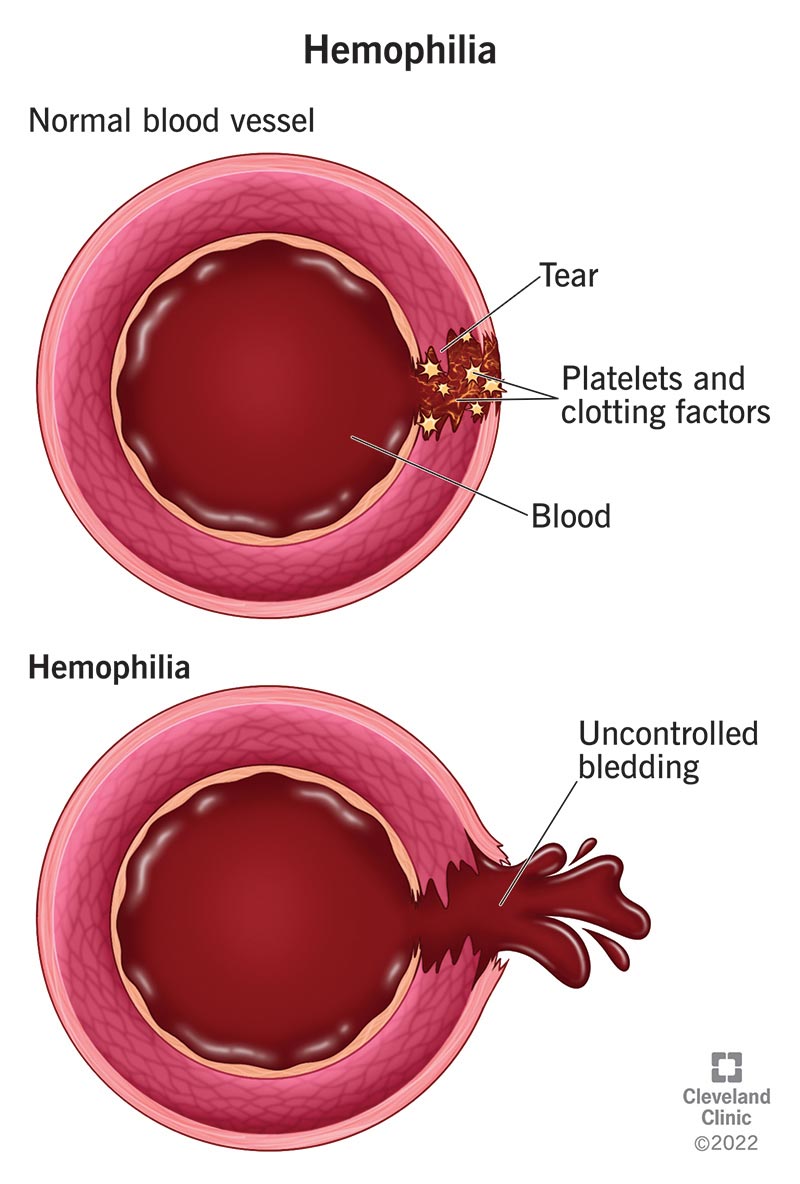A 20-year-old male patient with a known history of hemophilia A is brought to the emergency department with swelling and pain in his right knee after a minor fall. Which of the following is the most appropriate initial nursing intervention?
Prepare the patient for immediate surgical intervention.
Administer aspirin for pain relief.
Apply ice to the affected knee and elevate the leg.
Perform passive range of motion exercises on the affected knee.
The Correct Answer is C
Choice A Reason:
Preparing the patient for immediate surgical intervention is not the first-line treatment for hemophilia-related joint bleeding. Surgery is considered only if there is severe damage or if conservative measures fail. Initial management focuses on controlling bleeding and reducing inflammation.
Choice B Reason:
Administering aspirin for pain relief is contraindicated in patients with hemophilia. Aspirin inhibits platelet function and can exacerbate bleeding. Alternative pain management strategies that do not affect clotting should be used.
Choice C Reason:
Applying ice to the affected knee and elevating the leg is the most appropriate initial intervention. Ice helps to reduce swelling and pain, while elevation minimizes blood flow to the area, helping to control bleeding. This conservative approach is crucial in managing acute hemarthrosis in hemophilia patients.
Choice D Reason:
Performing passive range of motion exercises on the affected knee is not recommended during the acute phase of hemarthrosis. Movement can increase bleeding and worsen the condition. Rest and immobilization are preferred until the bleeding is controlled.

Nursing Test Bank
Naxlex Comprehensive Predictor Exams
Related Questions
Correct Answer is D
Explanation
Choice A Reason:
Prescription glasses can help improve vision in the early stages of cataracts by compensating for changes in the lens. However, they do not treat the underlying condition. As cataracts progress, glasses become less effective, and surgery becomes necessary to restore clear vision.
Choice B Reason:
Laser therapy is not used to dissolve cataracts. Instead, it is sometimes used after cataract surgery to treat a condition called posterior capsule opacification, which can occur months or years after the initial surgery. This procedure, known as YAG laser capsulotomy, helps to clear the vision but does not address the primary cataract.
Choice C Reason:
Anti-inflammatory eye drops can be used to manage inflammation and discomfort associated with cataracts or cataract surgery. However, they do not treat or remove the cataract itself. These drops are often part of the post-operative care following cataract surgery.
Choice D Reason:
Cataract surgery is the most effective treatment for cataracts. During the procedure, the clouded natural lens is removed and replaced with a clear artificial lens called an intraocular lens (IOL). This surgery significantly improves vision and is considered the definitive treatment for cataracts.
Correct Answer is C
Explanation
Choice A: Optic Neuritis
Optic neuritis is an inflammation of the optic nerve that can cause pain and vision loss. The pain typically worsens with eye movement, and vision loss usually occurs in one eye. Symptoms include temporary vision loss, visual field loss, loss of color vision, and flashing lights. However, optic neuritis does not typically cause nausea or seeing halos around lights, and the pupil reaction to light is usually preserved.
Choice B: Macular Degeneration
Macular degeneration primarily affects central vision and is more common in older adults. It can cause blurred or reduced central vision, difficulty recognizing faces, and visual distortions such as straight lines appearing bent. However, it does not cause sudden onset eye pain, nausea, or seeing halos around lights. The pupil reaction to light remains normal in macular degeneration.
Choice C: Narrow Angle Glaucoma
Narrow angle glaucoma, also known as acute angle-closure glaucoma, is a medical emergency characterized by a sudden increase in intraocular pressure. Symptoms include severe eye pain, nausea, vomiting, seeing halos around lights, and a mid-dilated, non-reactive pupil. This condition occurs when the drainage angle between the iris and cornea becomes blocked, leading to a rapid rise in eye pressure. Immediate treatment is necessary to prevent permanent vision loss.
Choice D: Cataract
Cataracts cause clouding of the lens, leading to symptoms such as blurred vision, difficulty seeing at night, sensitivity to light, and seeing halos around lights. However, cataracts develop gradually and do not cause sudden onset eye pain or nausea. The pupil reaction to light is also typically normal in cataract patients.
Whether you are a student looking to ace your exams or a practicing nurse seeking to enhance your expertise , our nursing education contents will empower you with the confidence and competence to make a difference in the lives of patients and become a respected leader in the healthcare field.
Visit Naxlex, invest in your future and unlock endless possibilities with our unparalleled nursing education contents today
Report Wrong Answer on the Current Question
Do you disagree with the answer? If yes, what is your expected answer? Explain.
Kindly be descriptive with the issue you are facing.
